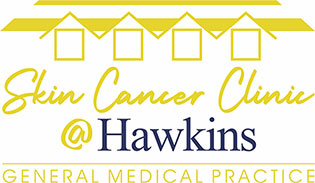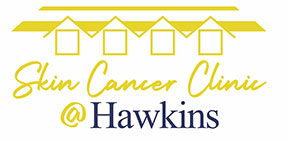

Hawkins Medical Clinic has offered a dedicated skin cancer clinic service for the past 14 years. We do unfortunately see many skin cancers in people under 50 and that is why everyone over 20 should try to be aware of what is happening on their skin and be sun smart to reduce severe sun exposure and later cancer risks. ANY spot, regardless of colour, that appears and persists for more than 2-4 weeks should be checked.
Understanding your skin cancer risk can help individuals take preventive measures and undergo regular skin checks with a skin cancer specialist or dermatologist, especially if they have multiple risk factors.
Skin cancer risk factors can be divided into several categories, including:
- Exposure to UV Radiation:
- Sunlight: Excessive exposure to UV rays from the sun is the greatest risk factor for all types of skin cancer. UV radiation damages DNA in skin cells, leading to mutations that can cause skin cancer.
- Tanning Beds: Artificial sources of UV radiation also increase the risk of skin cancer, including melanoma.
- Skin Type and Genetics:
- Fair Skin: People with fair skin that burns easily are at higher risk than those with darker skin tones, but those with darker skin are no immune
- Family History: Having a family history of skin cancer (especially melanoma) may increase your risk. Having a parent, sibling, or child who has had melanoma drastically increases your melanoma risk.
- Genetics: Certain genetic conditions (e.g.xeroderma pigmentosum, lynch syndrome, etc.) predispose individuals to skin cancer.
- Moles and Skin Conditions:
- Atypical Moles: Having many moles or atypical moles (also known as dysplastic nevi) may increase the risk.
- Skin Damage: Previous severe sunburns or other radiation damage.
- Immune Suppression:
- Individuals with weakened immune systems, such as organ transplant recipients, those with HIV/AIDS, or those on some rheumatological medications are at an increased risk.
- Chemical Exposure:
- Exposure to certain chemicals, such as arsenic, may increase the risk of developing skin cancer.
- Age and Gender:
- Skin cancer risk increases with age, especially after age 50.
- Men are more likely than women to develop basal cell carcinoma and squamous cell carcinoma.
- Geographic Location:
- Living closer to the equator or at higher altitudes increases UV exposure and thus skin cancer risk.
- Australia has some of the highest levels of UV radiation in the world – in fact, UV radiation is strong enough to cause sunburn in as little as 11 minutes on a fine summer day.
- Personal History:
- A previous history of skin cancer increases the risk of developing another skin cancer.
- Medical Conditions:
- Certain medical conditions, such as chronic skin inflammation or radiation therapy, may increase the risk.
- Lifestyle Factors:
- Smoking and a diet lacking in certain nutrients may contribute to an increased risk of skin cancer.
Dr Mike Bruorton, Dr Tim Harrison and Dr Rowan Kruysse are skin cancer GPs currently taking booking for full body skin checks and single spot checks.
For further information about skin cancer risk factors, please visit the Cancer Council website













